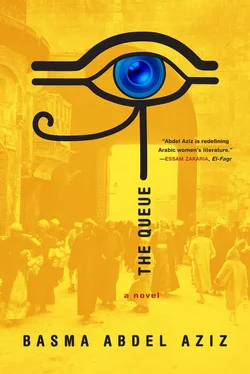But the woman with the short hair urged the boycott campaign onward, undaunted by the obstacles ahead. The vast majority of the queue joined her, those who were particularly keen to help rally others from farther afield, and she even considered extending an invitation to the outlying districts. Yet despite the campaign’s growth, nothing in the papers seemed to indicate that Violet Telecom had been affected in the least. Several papers published full-page advertisements featuring its name and bright violet logo. Then an article appeared in The Truth , so large it took up nearly half the front page, which said that Mr. Zaky Abd el-Aal Hamed, CEO, was delighted to announce that Violet Telecom now served more than thirty percent of the population. This meant that it was now the most widely used phone company in the country, and by a significant margin; the next most popular company served no more than five percent.
Yet while no newspapers or magazines covered the Violet Telecom boycott, their pages were filled with enthusiasm for other boycotts — all led by something called the Fatwa and Rationalizations Committee. The first boycott was against a candy factory that owned a well-known chain of stores in several districts. The Committee had discovered that this factory was producing candy made of sugar swirls, in which — in a certain light — one could make out the word “God.” The Committee released a statement calling upon people to boycott the factory, since allowing the name of God to be eaten and digested was the ultimate denigration of religion’s place in society and thus warranted a country-wide campaign.
Shalaby joined this boycott, too, after he recognized the factory’s name from some candy he’d brought along with a few other snacks from a small shop in his hometown. Pleading for God’s forgiveness and protection, he immediately destroyed the candy and burned the wrapper, as people around him cried out in praise of God’s greatness and commended his victory over the factory owner. The man in the galabeya had joined the boycott before him, and the two of them were joined by Um Mabrouk (who asked Abbas to write “Hope Factory Products Not Sold Here” on a cardboard sign, which she then put between two stones in front of the cookies), and the three of them were joined by Mrs. Alfat, who had finally appeared at the front of the queue.
Yehya insisted on crossing the vast distance to Mrs. Alfat himself. When he heard the news, Nagy tried to go in his place, but Yehya wouldn’t let him, that he would meet with her himself, and he set off as soon as they knew it was definitely her. Ehab described her as a short woman in her fifties, of medium build, and with broad shoulders. She was wearing a thin veil, only one layer of fabric, and no makeup except a thick line of kohl around her eyes. He also said that she was wearing wide-legged trousers, a long gray jacket that came down to her knees, and, unlike most other women, sneakers.
Yehya had no trouble recognizing her. He found her standing at the front of the queue already, not taking part in any of the conversations around her but clearly listening attentively to all that was said. She seemed on edge, uneasy with the general atmosphere. Yehya stood there for a few minutes watching her from afar, and to him she seemed stern, despite how calm and beautiful she looked. What would compel someone like her to leave such a prominent position? What had prompted her to abandon her workplace and home to stand in the queue just like him? So many thoughts and possible explanations rushed through his mind, but none of them made sense. He tried to guess how she might respond to his surprise visit, but soon tired of his useless speculations and felt silly waiting there so aimlessly, so he drew a deep breath, let it echo in his injured side, and headed toward her.
“Good afternoon.”
“Hello … can I help you?”
“My name is Yehya Gad el-Rab Saeed. I was a patient at the hospital you worked at.”
“Ah, pleasure to meet you. Is there something I can do for you?”
“Well, Dr. Tarek wanted to get ahold of the X-ray he performed on me at the hospital, but you were on vacation, so—”
“An X-ray of what, exactly?” she asked, cutting him off.
“An X-ray of my pelvis.”
“And when was this?”
“June eighteenth.”
Yehya would have preferred not to have to mention anything that might put her on guard, and instead to have left it up to her memory.
“The day of the Disgraceful Events,” she said sharply. “Sir, I didn’t receive any paperwork or X-rays that day — not yours, nor of anyone else who was injured, nothing. Even the people who died were then transferred to Zephyr Hospital. I’m quite certain you know that.”
Yehya was surprised by her cutting response, which didn’t leave him much room to respond.
“But Dr. Tarek took an X-ray of me, ma’am, I saw it myself, and just the other day he told me you had it.”
“That’s simply not true. I would advise you to meet with him again.”
He thanked her and left. He didn’t have the energy to argue or make her repeat herself, or even question her response; it was as if he’d known what she would say from the start. The door Tarek had opened for him had just been slammed in his face.
Amani, Yehya, and Nagy were forced to put off their meeting for several days, as the events unfolding around them didn’t leave time for much else. Nagy had been busy going over the conversations he’d had lately, reviewing what he had said and how involved he had been in them, so that he wouldn’t be caught off-guard if something happened. Finally, they all made time to have lunch at a restaurant across from the coffee shop.
Amani sat beside a large glass window, gazing down from the second floor onto the narrow street below, which seemed to have been cleaned of all shrapnel and debris recently. The restaurant hadn’t changed much since the last time she was here: the same scent of cheap detergent, the dark-green chairs, the small tiles that never reclaimed their true whiteness, the clay pots with edges eroding from how often the plants were watered; even the number of customers seemed the same. Amani had chosen her usual table. Twice she waved away the waiter, waiting for Nagy and Yehya, who were running late, and passed the time by watching people walking briskly below, imagining the two of them meandering along as usual.
It took a long time for Yehya to walk up the stairs, gripping the handrails for support and leaning his weight on Nagy’s shoulder. He never imagined that he would struggle up a flight of stairs like this, especially while still young. The pain peaked on the last step, and he stood paralyzed for a moment. Then finally he let go of Nagy and the railing and dropped his hands to his sides. He smiled, struggling to breathe normally, and headed to where he knew Amani would be sitting. He stood behind her chair and placed his hands on her shoulders, burying his lips in her hair for a long kiss. The waiter, having run out of patience, was back at their table for the third time as soon as they took their seats. Amani was about to tell him off, but Nagy, who had noticed the telltale way she was pursing her lips, that ominous sign that meant she was ready for a fight, intervened. He quickly ordered some eggplant, fuul beans, and fried eggs, while Yehya sat holding Amani’s hand and catching his breath.
Their conversation was dominated by recent developments; Yehya and Nagy had collected a bounty of intriguing news from around the queue, and took turns telling the stories. The woman with the short hair had earned even more animosity from the man in the galabeya; he disapproved of her stances on many issues, and it riled him so much that he wanted to banish her from the whole district. Ines had matter-of-factly declared that she wasn’t convinced by the Violet Telecom boycott without offering a reason, though she was often seen crying now that the rumors of the disappeared had grown more grave.
Читать дальше











